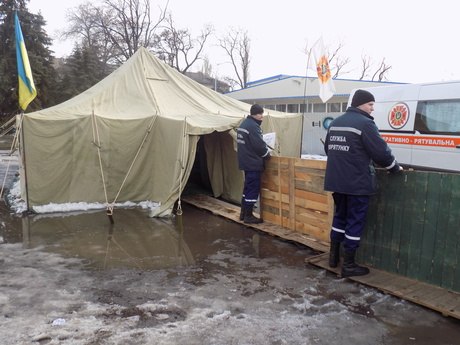SLOVIANSK, Ukraine – The snow is melting, causing the streets in front of the railway station of the former separatist-controlled Sloviansk to be covered in mud and water. Representatives of local authorities and a group of volunteers patiently await buses transporting the people that have fled Debaltseve, the nearby Donetsk Oblast city where fighting is ferocious.
For months, Kremlin-backed separatists have surrounded the strategically important city, which
could serve as a rail link between Donetsk and Luhansk, yet
the city remained under Ukrainian control. However, fighting escalated in mid-January, with insurgents launching an
offensive trying to regain control. Dozens of people have been killed and more wounded.
Due to the
increasingly violent situation, Ukrainian forces tried
to evacuate the city. Hundreds of civilians boarded buses transporting them
to Sloviansk, where volunteers would take care of them.
A group of
volunteers gather outside a camouflage tent, smoking a cigarette,
talking about their kids, as they wait for people to accommodate and help.
“We don’t know
what to expect, but we need to be prepared for more refugees. This tent will
accommodate refugees who want to remain in Sloviansk and have nowhere to live, or if more refugees are coming and all
places are full,” explains 26-year old
Vitaliy, who doesn’t want to be identified to protect his relatives living near separatist-controlled areas.
Vitaliy stares into the dirty mud and explains: “This will become only worse. People from Debaltseve are fleeing to our quiet
town. We know what it must be to have your hometown shelled. We will help them.
I only doubt that our help will be enough as many more people will become
displaced in this war. It just won’t end in Debaltseve.”
Some local
people from the church in Sloviansk stop by, bringing food to the volunteers. “We want this war to stop,” 61-year-old Irina Shevchanchuk explains in tear. “In Sloviansk there is no violence, but every day I see weapons,
refugees, wounded soldiers. I just want it to end!”
Near nightfall, two buses arrive at the central railway station. Local
authorities gather together with volunteers in front of the station’s entrance.
All refugees need to register and many opt to take a special train that
will bring them to Kharkiv or Kyiv. There, volunteers will take care of them,
and bring them to a special refugee shelter for those who cannot afford their
own accommodations.

Some refuse to go to Kharkiv or
Kyiv. “I have nothing. I don’t want to leave Donetsk Oblast!” shouts 71-year-old Elena Iskandorova from her bus seat, as she and others refuse to leave the
bus. “For 71 years I have lived in Donetsk Oblast. I only ask for peace.
Please!”
Some others join her in her shouting. Volunteers ask for silence, but don’t get it.
“I understand
that they’re frustrated, but we try the best we can,: Vitaliy says. “We could shelter them in Sviatohirsk,
but the shelters there are full. Maybe they can spend one or two nights in a
tent, but the best would be for them to be taken care of by volunteers in Kharkiv
or Kyiv. There they won’t have war on their minds, and there is place for them.
Once there’s no place in Kharkiv or Kyiv they might need to sleep in our tent.”
According to
the mayor of Sloviansk, Oleg Zanto, the train departing to Kharkiv and Kyiv can
accommodate 1,000 people coming from Debaltseve. “The train won’t
depart if there are less than 500 people on board. We expect 1,000 people, but
we just don’t know the exact number of people coming to our city.”
However, only some 200 people from Debaltseve, which had 25,000 people before the war, have made it to Sloviansk.
People arrive safely, but have no money.
“I took only one bag as my house was destroyed. I want
to go to Sumy, but I have no money for that,” 59-year old Pavel says. He is from Horlivka, a city controlled by separatist forces. He
refuses to give his last name as his mother still lives there and is not strong enough to travel.
Because of
Pavel’s registration in Horlivka, he hasn’t received his pension for seven
months, leaving him financially destitute.

As fighting
intensifies, the Ukrainian authorities have introduced a new system for
citizens to travel in and out separatist territory.
Pavel, too, needed this permit. “I was almost not allowed to cross the first Ukrainian checkpoint
as I didn’t have the appropriate documents,” he said.
The new system causes many
problems for Ukrainians wanting to flee separatist territory, as one can only
obtain the permit on Ukrainian-held territory. “I went to the nearest Ukrainian
checkpoint by bus from Horlivka, then waited two hours. I could hear artillery
nearby,” Pavel says.
Artillery has
become a nightmare for the refugees fleeing the city of hell. On the day they came to
Sloviansk on Jan. 31, another Kremlin-backed insurgent attack on Debaltseve killed 12 civilians.
“Debaltseve is just
not the end,” Vitaliy repeats.
Stefan Huijboom is a freelance Dutch journalist in Ukraine.
Editor’s Note: This article has been produced with support from www.mymedia.org.ua, financially supported by the Ministry of Foreign Affairs of Denmark, and implemented by a joint venture between NIRAS and BBC Media Action. Content is independent of the financial donor.
